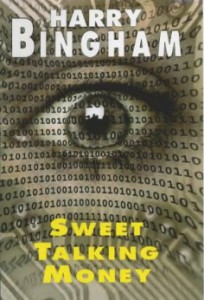Harry Bingham’s “Sweet Talking Money“ (published by Severn House in 2001) garnered three customer reviews on Amazon with headlines such as “Fabulous ‘Must Read’ Thriller” and “Masterpiece of a Financial Adventure.” After forcing myself to complete the 437-page tome, I concluded that the three reviews are an excellent example of “reviewer hyperbole.” The novel is certainly no masterpiece and contains too much farce to be mistaken for a thriller.
The set-up and the concept are excellent: A young scientist, Cameron, is working on immunology technology, the object of which is to program the body cells to fight disease, thus obviating the need for pills, shots, chemotherapy, radiation, etc. A financier, Bryn, sees the potential for this technology and persuades her to go into business with him. Their aim: to build a company, the Fulham Clinic, that, in addition to being worth billions of dollars (Bryn’s objective), will revolutionize the practice of medicine (Cameron’s objective). Their obstacles and sources of conflict: i) a large pharmaceutical company, Corinth, which is determined to protect its market, ii) an unscrupulous financial partner, and (iii) the frequent clashing of their objectives.
This is all set out in the first sixty pages of the (hardbound) edition.
But, here are a few of the incidents and plot twists that disturbed my fictive dream.
1) In the early stage of their business relationship, Bryn lies to Cameron when he tells her that she needs to assign all of her intellectual property rights to the company (which Bryn initially owns) for “insurance purposes.” And, it is a stretch to believe that a mature scientist such as Cameron would be so gullible as to fall for Bryn’s lie.
2) In order to identify a list of investors to whom to pitch the company, Bryn hires a teenage computer whiz, Mungo, to hack his former employer’s computer. Bryn seems to have no compunction about the illegality of the action, the risk to his career and the enterprise, nor the ethics. Also, it is difficult to understand why a seasoned investment banker would not have a large network of potential investors he could access rather than resorting to hacking.
3) In the process of negotiating the loan agreement with the unscrupulous Altmeyer, both he and Cameron are concerned about a certain clause that Altmeyer inserted, which, under certain circumstances (which are beyond the control of either Bryn on Cameron), gives Altmeyer the right to call the loan and take over the company.
Although they are both concerned about the clause, they decide not to challenge it – for reasons that are not explained. In effect, both Bryn and Cameron allow Altmeyer to set a time bomb, which – no surprise here – goes off about fifty pages later causing a crisis.
4) In an effort to defend themselves from Altmeyer’s plan to take over the Fullham Clinic, Bryn and Cameron decide to break into Altmeyer’s company, steal whatever technology they can and free all the laboratory animals (which Altmeyer does not treat humanely anyway). The burglary team includes Bryn, Cameron, Bryn’s brother–Dai, Mungo, Bryn’s assistant–Meg, and Cameron’s assistant–Kati. No one seems to have a problem about committing a felony or worries too much about the consequences of getting caught. The icing on the cake occurs when Meg seduces one of the guards, Degsy, and quickly converts him to their cause; and, subsequent to the burglary – which to no one’s surprise is successful–Degsey becomes a spy for Bryn and Cameron.
I could go on and on – but you get the point.
Finally, I found it very difficult to like either of the main characters. Bryn is a liar and a thief. Although he shows great affection and caring towards his parents, his integrity appears to be limited to the geography of the family farm. And Cameron, notwithstanding her lack of social sophistication and feminine skills, has no compunction about hacking into computers, participating in a burglary, and manipulating her new boyfriend to help her deceive a company he would like to work for. To paraphrase Marlon Brando in “On the Waterfront,” ‘It coulda been a great novel.” Unfortunately, it’s not!